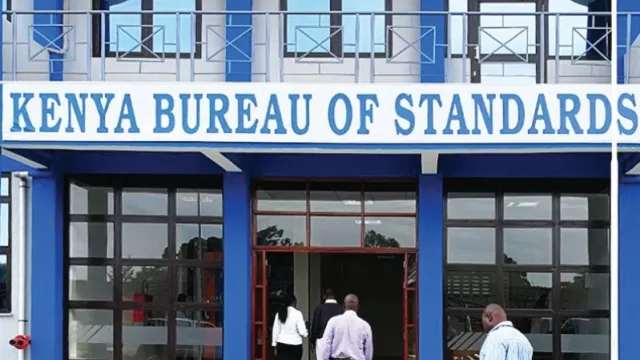KEBS unmasks two firms defrauding consumers

KEBS has unmasked MQA Certification Kenya Ltd and MQA Certification UK Ltd, two entities that have been issuing fake certificates to traders. (Photo/The Standard)
The Kenya Bureau of Standards (KEBS) has exposed two companies claiming to be working for the quality assurance agency, noting that consumers risk suffering huge losses by engaging with them.
In an update, KEBS unmasked MQA Certification Kenya Ltd and MQA Certification UK Ltd, two entities that have been issuing fake certificates to unsuspecting traders.
“It has come to our attention that entities going by the name MQA Certification Kenya Ltd and MQA Certification UK Ltd are purporting to have been approved by the Kenya Bureau of Standards to issue the certifications in Kenya,” read part of the notice.
"Please note that KEBS has not issued any such approval and is not affiliated with these entities in any way. The false statements, therefore, must be read as a manifest intention to defraud the public.”
The Kenyan market has been grappling with the proliferation of counterfeit goods with electronics, alcohol, tobacco, food products, and agricultural inputs market segments being the worst affected.
Earlier in the year, the Anti-Counterfeit Authority (ACA) estimated that the market is flooded with counterfeit goods worth over KES100 billion.
In October, an investigation by the Senate revealed that counterfeit edible oils imported between May and November last year were in circulation in the country, putting millions of Kenyans at risk of consuming substandard oils.
In 2022, the Kenya National Trading Corporation (KNTC) contracted suppliers to import edible oils to help stabilize prices for the food item. Unfortunately, only 44 out of the 73 consignments that arrived were approved by KEBS with 23 still pending customs clearance.
Read also: G4S joins layoff surge as economic woes drive job cuts
Contaminated rice
Additionally, media reports show that quality control officers from KEBS seized 15,000 bags of contaminated rice that had been hidden under sacks of flour in a warehouse, which served as a distribution point to unsuspecting consumers in Embakasi.
Earlier this year, thousands of bags of fake fertilizer were sold to unsuspecting farmers around the country, significantly denting the government strategy to subsidize the key farm input to step up food security.
What’s more, roughly 18 tonnes of fake seeds were intercepted by the Kenya Plant Health Inspectorate Service (Kephis) in 13 counties.



